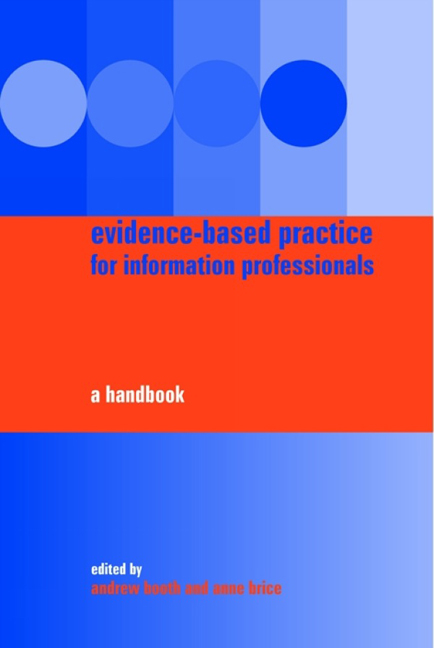Book contents
- Frontmatter
- Contents
- Foreword
- Editors and contributors
- Part 1 The context for evidence-based information practice
- Part 2 Skills and resources for evidence-based information practice
- Part 3 Using the evidence base in practice
- 13 Six domains of evidence-based information practice
- 14 Examining the evidence base for reference services and enquiry work
- Special Topic (A) Provision of a current awareness service for research staff (Guideline)
- 15 The contribution of evidence-based practice to educational activities
- Special Topic (B) How can I train my users? (Evidence Digest)
- 16 An evidence-based approach to collection management
- Special Topic (C) Electronic or paper: how do I manage my journals collection? (Evidence Digest)
- 17 Towards evidence-based management
- Special Topic (D) How do I measure the impact of my service? (Guideline)
- Special Topic (E) Should I charge and, if so, what should I charge for? (Evidence Briefing)
- 18 Evidence-based perspectives on information access and retrieval
- Special Topic (F) What are the characteristics of a good searcher? (Critically Appraised Topic)
- Special Topic (G) Which database, which interface? (Guideline) 251
- 19 Introducing an evidence-based approach to marketing and promotional activities
- Special Topic (H) Determining the information needs of practising nurses postregistration in the UK from 1990 to 2003 (Evidence Digest)
- 20 A future for evidence-based information practice?
- Index
16 - An evidence-based approach to collection management
from Part 3 - Using the evidence base in practice
Published online by Cambridge University Press: 08 June 2018
- Frontmatter
- Contents
- Foreword
- Editors and contributors
- Part 1 The context for evidence-based information practice
- Part 2 Skills and resources for evidence-based information practice
- Part 3 Using the evidence base in practice
- 13 Six domains of evidence-based information practice
- 14 Examining the evidence base for reference services and enquiry work
- Special Topic (A) Provision of a current awareness service for research staff (Guideline)
- 15 The contribution of evidence-based practice to educational activities
- Special Topic (B) How can I train my users? (Evidence Digest)
- 16 An evidence-based approach to collection management
- Special Topic (C) Electronic or paper: how do I manage my journals collection? (Evidence Digest)
- 17 Towards evidence-based management
- Special Topic (D) How do I measure the impact of my service? (Guideline)
- Special Topic (E) Should I charge and, if so, what should I charge for? (Evidence Briefing)
- 18 Evidence-based perspectives on information access and retrieval
- Special Topic (F) What are the characteristics of a good searcher? (Critically Appraised Topic)
- Special Topic (G) Which database, which interface? (Guideline) 251
- 19 Introducing an evidence-based approach to marketing and promotional activities
- Special Topic (H) Determining the information needs of practising nurses postregistration in the UK from 1990 to 2003 (Evidence Digest)
- 20 A future for evidence-based information practice?
- Index
Summary
Introduction
This chapter outlines the main components of collection management within the increasingly popular concept of the ‘hybrid’ collection which brings together both paper and electronic sources. It identifies a range of questions that management of such collections needs to address. The evidence base is characterized in terms of useful sources and important research studies. This chapter is followed by a special topic examining the research evidence on managing the electronic/ paper mix in connection with journal holdings.
What is evidence-based collection management?
The third domain identified by Crumley and Koufogiannakis (2002) is Collections by which they refer to the activity of: ‘building (and we could add maintaining) a high-quality collection of print and electronic materials that is useful, cost-effective and meets the users’ needs’.
The broad term ‘collection management’ includes collection development, maintenance and withdrawal. Collection development involves ‘planning, goalsetting, decision-making, budgeting, and acquiring materials and evaluating them’ (Gessesse, 2000). Richards and Eakin (1997) emphasize the centrality of this domain to information practice: ‘The library's collection is its heart because it is the collection that is the central information resource upon which most library activities rely …. Today's vision of the collection must incorporate both a broader range of materials … and a greater sense of connectivity’.
The first impression on reviewing this domain is the tremendous spectrum encompassed, from management-oriented tasks of collection development to the physical (or even electronic) sciences involved in preservation or restoration of printed or electronic materials. Some observers identify the specific field of archive management as one of the most unequivocally ‘evidence-based’ areas of information practice. On the other hand, Scott Plutchak, in reviewing collection development, affirms that ‘as with so much else in librarianship (and medicine, for that matter), [it] remains more of an art than a science’ (Plutchak, 2003). If evidence-based information practice is the science of making decisions then our view of evidence-based collection management has to be reconciled with the observation of Richards and Eakin (1997) that: ‘Librarians make decisions about collections …. Some claim these decisions are primarily an art; others argue that they are, or should be, grounded in scientific methods’.
- Type
- Chapter
- Information
- Evidence-based Practice for Information ProfessionalsA Handbook, pp. 185 - 195Publisher: FacetPrint publication year: 2004
- 1
- Cited by



